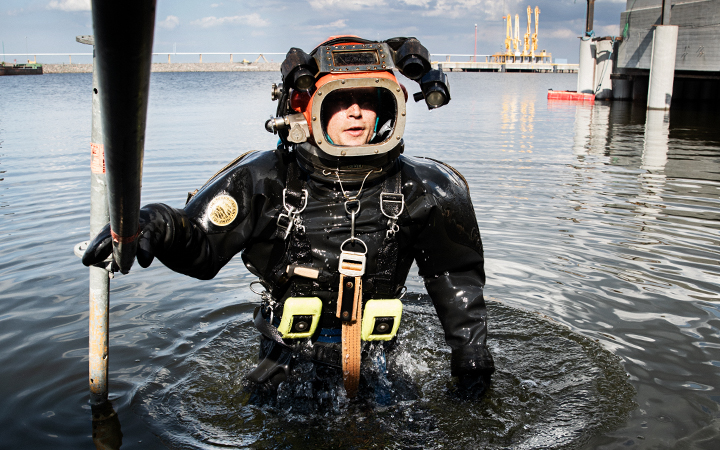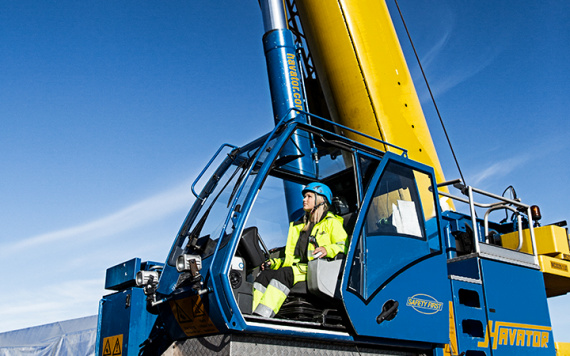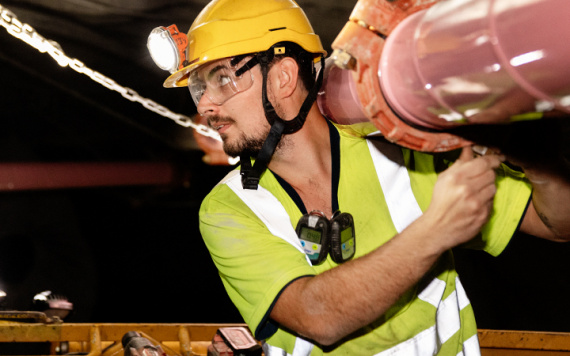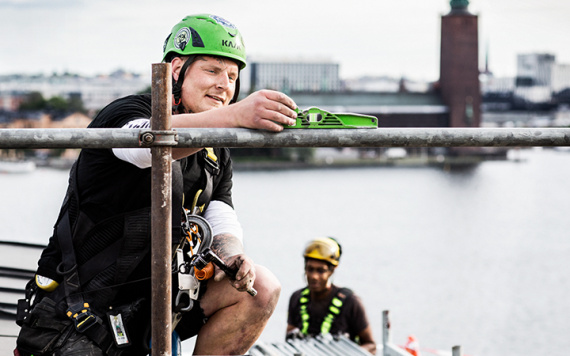Commercial diver
Problem solving under water
Working as a commercial diver, you will definitely be in over your head. You work down to a depth of 50 metres, but mostly in the range of 0-10 metres. It is a demanding and varied profession with tough physical and professional requirements.
What does a commercial diver do?
The labour market for commercial divers is good and there is a high demand for qualified divers in the building and construction sector. About half of the working time is spent in or under water. Activities can be building and repairing bridges or constructing harbours, channels and power plants, for example. Example tasks include excavating, drilling, blasting, welding, constructing forms, reinforcing and casting.
The duration of assignments can vary from a few hours to several months. The job of a commercial diver is varied, but is also demanding. Your physical fitness and professional skills are therefore very important. Problems often arise that you have to solve under tough conditions. Important qualities for a site diver include an ability to handle stress and to rely on your judgement and creativity.
NOT A SECONDARY SCHOOL EDUCATION
It is currently not possible to become a commercial diver through secondary education. Oonly via adult education, as a company apprentice or via a construction diving programme in another country.

How can I become a commercial diver via adult education?
You can attend a 2-year (full-time) professional programme of 400 HVE (higher vocational education) credits. The programme is conducted in collaboration with the City of Gothenburg’s adult education programme, YRGO.
You must pass the certification requirements for the B certificate during the training.
The adult education programme
The training programme includes diving medicine, work environment issues, English and technology, diving with standard equipment, formwork, reinforcement and concrete casting, drilling and blasting, excavation work, steelwork, pipe laying, inspection, documentation and production management. One third of the programme comprises a practical assignment in a diving company, giving you the opportunity to apply your skills and make good contacts in the industry.
qualification period
Once your initial training is completed, your qualification period as an apprentice starts. The programme is company-based and requires 800 logged diving hours to obtain a professional certificate. You must independently apply for an apprenticeship position in a company with a collective agreement or labour contract. You will receive an agreed-upon wage during the qualification period.
How can I become a commercial diver as a company apprentice?
It is helpful if you have a background in wood, concrete or construction work and possibly also a professional certificate in one of these trades. But this is not necessary. You must first, you apply for a job as an apprentice diver with one of the country’s diving companies.
You must fulfil the following requirements to become an apprentice diver:
- You must be at least 18 years of age.
- You must have undergone a health check and been authorised to work as a diver (AFS 2005:6).
- You must have received basic diving training, at least level 2 in an approved sport diving system.
- You must have a basic education in building and construction (if this is not available, you can study it in a distance learning programme).
Depending on your prior experience, you must complete a mixed programme of theoretical and practical training of roughly 3,300 hours based in the company. At the end of your training, you must undergo a training check to obtain your diving certificate (B-50).
qualification period
Once your initial training is completed, your qualification period as an apprentice starts. The programme is company-based and requires 800 logged diving hours to obtain a professional certificate. You will receive an agreed-upon wage during the qualification period. You must independently apply for an apprenticeship position in a company with a collective agreement or labour contract.
The distance learning programme is conducted via Yrgo.
How can I become a commercial DIVER VIA A SITE DIVING TRAINING PROGRAMME IN ANOTHER COUNTRY?
You can receive commercial diving training at a number of locations abroad and obtain an IDSA level 3 diving certificate which is equivalent to the Swedish B certificate.
In order to obtain a professional certificate as a commercial diver in Sweden, your professional knowledge and previous experience in the construction sector must be validated to obtain credit for your basic training. Following validation, you may need to supplement your professional skills through distance learning, depending on the level of your experience and accumulated competence.
qualification period
Once your initial training is considered complete, your qualification period as an apprentice starts. The programme is company-based and requires 800 logged diving hours to obtain a professional certificate. You must independently apply for an apprenticeship position in a company with a collective agreement or labour contract. You will receive an agreed-upon wage during the qualification period.


